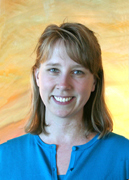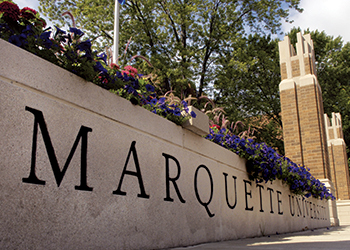My overarching pedagogical commitment—across a wide range of classes on writing, the teaching of writing, and drama—is my desire to help students integrate what they are learning and doing in my class with the knowledge and skills they have developed in other classes or contexts. I think, for instance, of a student in my musicals class who analyzed Into the Woods in light of the “ethics of caring” he had studied in philosophy. Another student, completing an internship at a local magazine, described in office hours the applications and limitations of the “bad-news memo” techniques she had studied in Writing for the Professions. It’s not enough for students to regurgitate the facts I taught them in contexts similar to the one I constructed in class: ultimately, I seek to develop what Lee Shulman has called a “pedagogy of uncertainty,” enabling students to move into novel contexts and to exercise reflective judgment under conditions of uncertainty. Some people call this critical thinking; I think of it as helping students to become (what I call in my book manuscript) “agents of integration”—capable of articulating connections between prior learning and new contexts.
To achieve these ambitious pedagogical goals, I seek to foster a sense of community in the classroom. My most important role in this community is not to dispense knowledge but to sequence readings, in-class activities, and writing assignments that will help students develop their knowledge and cultivate the confidence to repurpose that knowledge as necessary in unfamiliar circumstances.
There are many small and perhaps obvious ways to foster a sense of community: helping all class members to learn everyone’s name, making sure ideas are not ridiculed, working to incorporate (with repeated attributions) the ideas and vocabulary introduced by members of the class. When community is at its strongest we laugh together a lot, but building a sense of community is not simply about liking one another; it is about creating a climate that encourages students to ask questions and respectfully challenge answers.
For that reason, the foundation of the intellectual community that I work to foster is a participatory culture. I know the participatory culture is taking root when, for instance, my Advanced Composition students stay after the class period is over to continue talking about each other’s drafts, and voluntarily meet outside of class to continue those conversations. I experience the participatory culture at work when an Art of Rhetoric student asks to come to the board to draw, next to mine, a competing illustration of Saussure’s ideas of langue and parole. I saw evidence of a participatory culture when the honors students in my Full-Circle Seminar on democracy persuaded me to undertake an experiment in creating a truly democratic classroom. They revised course assignments, articulated grading criteria, and set for themselves the task of writing a proposal to the honors director to replicate this experience in subsequent classes.
As the classroom community—and each student’s recognition of his or her own key role in that community—grows stronger, my role shifts. At the beginning of the semester, most students look to me as an expert in the field of study, and I enjoy sharing the knowledge I possess. I take pleasure, for example, in introducing new writing center tutors and graduate teaching assistants to the current best research on effective revision practices. I enjoy explaining to Intro to Drama students the history of Hamlet’s First Folio and the so-called “bad quarto” and helping them think through how the placement of the “to be or not to be” speech in each encourages a very different perception of Hamlet. I am even happy to teach students how restrictive and non-restrictive modifiers determine when to use “that” or “which” in a sentence. But my job as a teacher goes beyond the transmission of such knowledge.
Instead—as examples from my American Drama, Jury Project, and Processes of Writing courses illustrate—my job is to design courses and assignment sequences that challenge students to apply and transform that knowledge to solve new problems. In the American Drama survey (which focuses on the American musical as a lens for examining changing attitudes towards race, gender, and sexual orientation), we study five musicals together as a class; then students write a seminar paper on a musical they research individually throughout the semester. My challenge is to help these students—many of whom are not English majors—do the hard work of developing an extended critical analysis on their own. I have developed a careful sequence of “building block assignments” (included in my teaching portfolio) that lead students through the process of comparing the musical to original source material and to later movie versions, reading contemporary reviews, and writing a close analysis of a single song.
Similarly, in the Jury Project course, I immerse students into the immensely complex, real-world problems of Supreme Court cases like Massachusetts v. EPA. This is a writing course, not a law course. Although some students bring an interest in law (and a desire to attend law school), my goal is not to make them experts in constitutional law. Rather I want them to embrace the process of reading incredibly complex arguments that hinge on careful reading of difficult texts (briefs, precedents, legislation, etc.). As they work through three cases in 15 weeks, students learn to admit what they do not understand and to wrestle with the intellectual and ethical challenges of rendering their own opinion. They also learn to rely on conversations with their classmates to help them challenge and ultimately clarify their own thinking. The key to their increasing engagement and skill with these difficult cases is again a careful sequence of assignments (also included in my teaching portfolio): from a summary of a brief, to analytical maps and imagined dialogues, to culminating oral arguments and deliberations.
More than in any other class I teach, the need to exercise reflective judgment under conditions of uncertainty is evident in my work in the “Writing Center Research, Theory, and Practice” class, educating future writing center tutors. The core of writing center tutoring rests on an ability to work with any writer on any topic; consequently, experienced writing center tutors become expert in working outside their own areas of more traditional scholarly expertise. To help students develop the knowledge and skills that will help them confront such uncertainty with confidence and success, the central pedagogical activity of the course is 15 hours of writing-center observation and reflection. This iterative process of reading, watching, reflecting (and eventually, by the end of the semester, doing) encourages students to connect what they know from their experiences as a writer and a novice tutor with what they have learned through our course readings. This course epitomizes my commitment—visible in my research as well as my teaching—to helping students integrate their knowledge, skills, and personal commitments across the curriculum.
 Co-Director, Ott Memorial Writing Center
Co-Director, Ott Memorial Writing Center


